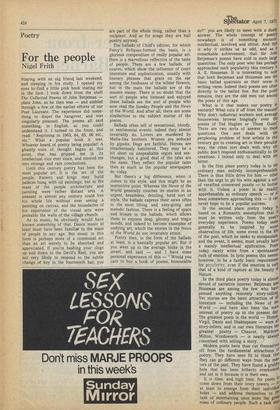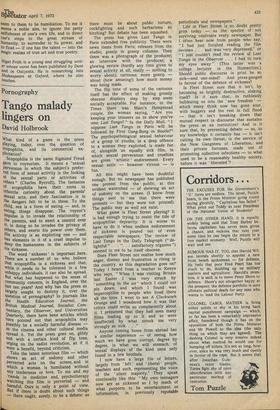Poetry
For the people
Nigel Frith
Staying with an old friend last weekend, and sleeping in his study, I opened my eyes to 'find a little pink book staring me in the face. j took down from the shelf The Collected Poems of John Betjeman — plain John, as he then was — and ambled through a few of the earlier efforts of our Poet Laureate. The experience did something to dispel the hangover, and was singularly pleasant. The poems all said something, in English, so you could understand it. I turned to the front, and read: "Reprinted in 1963, 64, 65, 66 etc., etc." What a popular book it was. Whoever heard of poetry being popular! A ghastly train of thought began at this point, that has gripped me in its intellectual vice ever since, and steered me into strange and rare conclusions.
Until this century poetry has been the most popular art. It is the art of the people. Kaisers and kings may build palaces hung with oil paintings, but to ehe mass of the people architecture and painting were rather distant arts. A peasant in almost any century could live his whole life without ever seeing a painting on canvas, and the boundaries of his experience of the visual arts were probably the walls of the village church.
As to music, he obviously would have known something of that. Dance music at least must have been familiar to the mass of people in any age. But music in this form is perhaps more of a communal art than an art merely to be absorbed and appreciated. If you're bashing your clogs up and down to the Devil's Reel, you are not very likely to respond to the subtle change of key in the fourteenth bar; you are part of the wshole thing, rather than a recipient. And as for songs they are half poetry anyway.
The ballads of Child's edition, for which Percy's Reliques formed the basis, is a glorious compendium of really popular art. Here is a marvellous reflection of the taste of people. There are a few ballads, of course, which show the influence of court literature and sophistication, usually with literary phrases that grate on the ear among the freshness of the wilder flowers, but in the main the ballads are of the masses massy. There is no doubt that the sort of people who listened and enjoyed these ballads are the sort of people who now read the Sunday People and the News of the World. And after all, there are some similarities in the subject matter of the pieces.
Ballads often tell of sensational, bloody, or sentimental events: indeed they almost invariably do. Lovers are murdered by Mafia-like brothers. Women are seduced by gipsies. Dogs are faithful. Heroes are treacherously butchered. They may be a bit short on unspeakable orgies and sexchanges, but a good deal of the tales are the same. They reflect the popular taste then as much as the popular newspapers do today.
But there's a big difference, when it comes to the style, and this might be an instructive point. Whereas the News of the World generally couches its stories in an urgent, breathless, drooling, lurid sort of style, the ballads express their news often in the most lilting and easy-going and melodic fashion. There is a feeling of space and leisure in the ballads, which allows them to express deep, gloomy and tragic moods, and indeed to become examples of undying art, which the stories in the News of the World do not invariably attain.
Poetry then, in the form of the ballads at least, is a basically popular art. But if you went up to the average bloke in the street, and said — and I have some personal experience of this — "Would you care to buy a book of poems, honourable sir?" you are likely to meet with a dustY answer. The whole concept of poetrY nowadays is of something esoteriC, intellectual, involved and elitist. And this is why it strikes us as odd, and as a remarkable achievement, that Sir John Betjeman's poems have sold in such large quantities. The only poet who has perhaps approached such popularity this century is A. E. Housman. It is interesting to note that both Betjeman and Housman use the basic ballad quatrains as their norm In writing verse. Indeed their poems are often directly in the ballad line. But the point remains, they are the odd men out among the poets of this age.
What is it that makes our poetry an esoteric? What cuts if off from the masseS? Why don't industrial workers and average housewives browse longingly over the poems of Ted Hughes or Thom Gunn? There are two sorts of answer to these questions. One sort deals with the perplexing problem of how artists in this century got to creating art in their peculiar way, the other sort deals with why the public don't respond enthusiastically to the creations. I intend only to deal with the latter.
In the first place poetry today is to the ordinary man entirely incomprehensible. There is thus little drive for him — other than the urge to pit his wits against a sort of versified crossword puzzle — to bother with it. Unless a poem is as readilY apprehensible as ordinary speech — or at least somewhere approaching this — it can never hope to be a popular success. In the second place poetry today ig based on a Romantic assumption that It must be written only from the poetiS everyday experience. Poems today see generally to be •inspired by solne observation of life, some event in the life of the poet, which he seeks to encapsulates and the event, it seems, must usually haVe a mainly intellectual application. Poets today rarely write from a spontaneous rush of emotion. In lyric poems this seerns. however, to be a fairly basic requirement for popularity, even if the emotion is onlY, that of a kind of rapture at the beauty 0' Nature.
In the third place poetry today is almost devoid of narrative interest. Betjeman any Housman are among the few who have penned anything remotely story-telling. Yet stories are the basic attraction of all literature — including the News of the World — and have also been the mein interest of poetry up to the present daY. The greatest poets in the world — Homer; Virgil, Dante and Shakespeare — were al' story-tellers; and in our own literature the greatest poetry — Chaucer, MairloWe' Milton, Wordsworth — is nearly lalwaY5 concerned with telling a story. ' Modern poets have thus cut themselves, off from the fundamental attractions poetry. They have seen fit to think that they can go different ways from the alas' ters of the past. They have found a grubbY hole that has been hitherto overlooked' and sat in it because it is their own.
It is time, and high time, for poets Se) come down from their ivory towers — at least to emerge from their individua' holes — and address themselves to the, task of entertaining once more the greal mass of ordinary people. Such a task MaY
seem to them to be humiliation. To me it seems a noble aim, to ignore the petty selfishness of one's own life, and to direct one's steps to the great stream of humanity, to surrender to its power, and to float — if one has the talent — into the Magic realms of true art and true poetry.
Nigel Frith is a young and struggling writer whose verse has been published by Dent Qnd in Outposts. He is researching into Shakespeare at Oxford, where he also teaches.



































 Previous page
Previous page